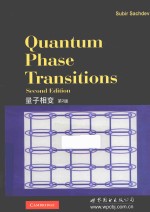图书介绍
量子相变 第2版 英文2025|PDF|Epub|mobi|kindle电子书版本百度云盘下载

- (美)萨奇德夫著 著
- 出版社: 北京:世界图书北京出版公司
- ISBN:9787510084478
- 出版时间:2015
- 标注页数:501页
- 文件大小:82MB
- 文件页数:517页
- 主题词:量子-相变-研究-英文
PDF下载
下载说明
量子相变 第2版 英文PDF格式电子书版下载
下载的文件为RAR压缩包。需要使用解压软件进行解压得到PDF格式图书。建议使用BT下载工具Free Download Manager进行下载,简称FDM(免费,没有广告,支持多平台)。本站资源全部打包为BT种子。所以需要使用专业的BT下载软件进行下载。如BitComet qBittorrent uTorrent等BT下载工具。迅雷目前由于本站不是热门资源。不推荐使用!后期资源热门了。安装了迅雷也可以迅雷进行下载!
(文件页数 要大于 标注页数,上中下等多册电子书除外)
注意:本站所有压缩包均有解压码: 点击下载压缩包解压工具
图书目录
Part Ⅰ Introduction1
1 Basic concepts3
1.1 What is a quantum phase transition?3
1.2 Nonzero temperature transitions and crossovers5
1.3 Experimental examples8
1.4 Theoretical models9
1.4.1 Quantum Ising model10
1.4.2 Quantum rotor model12
1.4.3 Physical realizations of quantum rotors14
2 Overview18
2.1 Quantum field theories21
2.2 What's different about quantum transitions?24
Part Ⅱ A first course27
3 Classical phase transitions29
3.1 Mean-field theory30
3.2 Landau theory33
3.3 Fluctuations and perturbation theory34
3.3.1 Gaussian integrals36
3.3.2 Expansion for susceptibility39
Exercises42
4 The renormalization group45
4.1 Gaussian theory46
4.2 Momentum shell RG48
4.3 Field renormalization53
4.4 Correlation functions54
Exercises56
5 The quantum Ising model58
5.1 Effective Hamiltonian method58
5.2 Large-g expansion59
5.2.1 One-particle states60
5.2.2 Two-particle states61
5.3 Small-g expansion64
5.3.1 d=264
5.3.2 d=166
5.4 Review67
5.5 The classical Ising chain67
5.5.1 The scaling limit70
5.5.2 Universality71
5.5.3 Mapping to a quantum model:Ising spin in atransversefield72
5.6 Mapping of the quantum Ising chain to a classical Ising model74
Exercises77
6 The quantum rotor model79
6.1 Large-?expansion79
6.2 Small-?expansion80
6.3 The classical X Y chain and an O(2)quantum rotor82
6.4 The classical Heisenberg chain and an O(3)quantum rotor88
6.5 Mapping to classical field theories89
6.6 Spectrum of quantum field theory90
6.6.1 Paramagnet91
6.6.2 Quantum critical point92
6.6.3 Magnetic order92
Exercises95
7 Correlations,susceptibilities,and the quantum critical point96
7.1 Spectral representation97
7.1.1 Structure factor98
7.1.2 Linear response99
7.2 Correlations across the quantum critical point101
7.2.1 Paramagnet101
7.2.2 Quantum critical point103
7.2.3 Magnetic order104
Exercises107
8 Broken symmetries108
8.1 Discrete symmetry and surface tension108
8.2 Continuous symmetry and the helicity modulus110
8.2.1 Order parameter correlations112
8.3 The London equation and the superfluid density112
8.3.1 The rotor model115
Exercises115
9 Boson Hubbard model117
9.1 Mean-field theory119
9.2 Coherent state path integral123
9.2.1 Boson coherent states125
9.3 Continuum quantum field theories126
Exercises130
Part Ⅲ Nonzero temperatures133
10 The Ising chainin atransversefield135
10.1 Exact spectrum137
10.2 Continuum theory and scaling transformations140
10.3 Equal-time correlations of the order parameter146
10.4 Finite temperature crossovers149
10.4.1 Low T on the magnetically ordered side,△>0,T《△151
10.4.2 Low T on the quantum paramagnetic side,△<0,T《|△|157
10.4.3 Continuum high T,T》| △|162
10.4.4 Summary168
11 Quantum rotor models:large-N limit171
11.1 Continuum theory and large-N limit172
11.2 Zero temperature174
11.2.1 Quantum paramagnet,g>gc175
11.2.2 Critical point,g=gc177
11.2.3 Magnetically ordered ground state,g<gc178
11.3 Nonzero temperatures181
11.3.1 Low T on the quantum paramagnetic side,g>gc,T《△+186
11.3.2 High T,T》△+,△-186
11.3.3 Low T on the magnetically ordered side,g<gc,T《△-187
11.4 Numerical studies188
12 Thed=1,0(N≥3)rotormodels190
12.1 Scaling analysis at zero temperature192
12.2 Low-temperature limit ofthe continuum theory,T《△+193
12.3 High-temperature limit of the continuum theory,△+《T《J199
12.3.1 Field-theoretic renormalization group201
12.3.2 Computation of xu205
12.3.3 Dynamics206
12.4 Summary211
13 The d=2,0(N≥3)rotor models213
13.1 Low T on the magnetically ordered side,T《ρs215
13.1.1 Computation of ξc216
13.1.2 Computation of τψ220
13.1.3 Structure of correlations222
13.2 Dynamics of the quantum paramagnetic and high-T regions225
13.2.1 Zero temperature227
13.2.2 Nonzero temperatures231
13.3 Summary234
14 Physics close to and above the upper-critical dimension237
14.1 Zero temperature239
14.1.1 Tricritical crossovers239
14.1.2 Field-theoretic renormalization group240
14.2 Statics at nonzero temperatures242
14.2.1 d<3244
14.2.2 d>3248
14.3 Order parameter dynamics in d=2250
14.4 Applications and extensions257
15 Transportind=2260
15.1 Perturbation theory264
15.1.1 σI268
15.1.2 σII269
15.2 Collisionless transport equations269
15.3 Collision-dominated transport273
15.3.1 ∈expansion273
15.3.2 Large-N limit279
15.4 Physical interpretation281
15.5 The AdS/CFT correspondence283
15.5.1 Exact results for quantum critical transport285
15.5.2 Implications288
15.6 Applications and extensions289
Part Ⅳ Other models291
16 Dilute Fermi and Bose gases293
16.1 The quantum XX model296
16.2 The dilute spinless Fermi gas298
16.2.1 Dilute classical gas,kBT《|μ|,μ<0300
16.2.2 Fermi liquid,kBT《μ,μ>0301
16.2.3 High-T limit,kBT》|μ|304
16.3 The dilute Bose gas305
16.3.1 d<2307
16.3.2 d=3310
16.3.3 Correlators of ZB in d=1314
16.4 The dilute spinful Fermi gas:the Feshbach resonance320
16.4.1 The Fermi-Bose model323
16.4.2 Large-N expansion327
16.5 Applications and extensions331
17 Phase transitions of Dirac fermions332
17.1 d-wave superconductivity and Dirac fermions332
17.2 Time-reversal symmetry breaking335
17.3 Field theory and RG analysis338
17.4 Ising-nematic ordering342
18 Fermi liquids,and their phase transitions346
18.1 Fermi liquid theory347
18.1.1 Independence of choice of?0354
18.2 Ising-nematic ordering355
18.2.1 Hertz theory356
18.2.2 Fate of the fermions358
18.2.3 Non-Fermi liquid criticality in d=2360
18.3 Spin density wave order363
18.3.1 Mean-field theory364
18.3.2 Continuum theory365
18.3.3 Hertz theory367
18.3.4 Fate of the fermions368
18.3.5 Critical theory in d=2369
18.4 Nonzero temperature crossovers370
18.5 Applications and extensions374
19 Heisenberg spins:ferromagnets and antiferromagnets375
19.1 Coherent state path integral375
19.2 Quantized ferromagnets380
19.3 Antiferromagnets385
19.3.1 Collinear antiferromagnetism and the quantum nonlinear sigma model385
19.3.2 Collinear antiferromagnetism in d=1388
19.3.3 Collinear antiferromagnetism in d=2390
19.3.4 Noncollinear antiferromagnetism in d=2:deconfined spinons and visons395
19.3.5 Deconfined criticality401
19.4 Partial polarization and canted states403
19.4.1 Quantum paramagnet405
19.4.2 Quantized ferromagnets406
19.4.3 Canted and Néel states406
19.4.4 Zero temperature critical properties408
19.5 Applications and extensions410
20 Spin chains:bosonization412
20.1 The XX chain revisited:bosonization413
20.2 Phases of H12423
20.2.1 Sine-Gordon model425
20.2.2 Tomonaga-Luttinger liquid428
20.2.3 Valence bond solid order428
20.2.4 Néel order431
20.2.5 Models with SU(2)(Heisenberg)symmetry431
20.2.6 Critical properties near phase boundaries433
20.3 O(2)rotor modelin d=1435
20.4 Applications and extensions436
21 Magnetic ordering transitions of disordered systems437
21.1 Stability of quantum critical points in disordered systems438
21.2 Griffiths-McCoy singularities440
21.3 Perturbative field-theoretic analysis442
21.4 Metallic systems445
21.5 Quantum lsing models near the percolation transition447
21.5.1 Percolation theory447
21.5.2 Classieal dilute Ising models448
21.5.3 Quantum dilute Ising models449
21.6 The disordered quantum Ising chain453
21.7 Discussion460
21.8 Applications and extensions461
22 Quantum spin glasses463
22.1 The effective action464
22.1.1 Metallic systems469
22.2 Mean-feld theory470
22.3 Applications and extensions477
References479
Index496
热门推荐
- 109237.html
- 634275.html
- 993680.html
- 3441343.html
- 812232.html
- 2611080.html
- 3843542.html
- 971395.html
- 1635238.html
- 328092.html
- http://www.ickdjs.cc/book_676371.html
- http://www.ickdjs.cc/book_1770736.html
- http://www.ickdjs.cc/book_2076214.html
- http://www.ickdjs.cc/book_964483.html
- http://www.ickdjs.cc/book_3369058.html
- http://www.ickdjs.cc/book_3030438.html
- http://www.ickdjs.cc/book_722046.html
- http://www.ickdjs.cc/book_462068.html
- http://www.ickdjs.cc/book_3572612.html
- http://www.ickdjs.cc/book_2066135.html